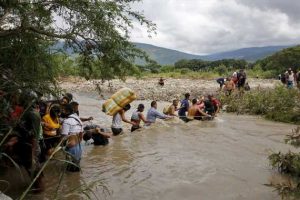Attacks and Insults Greet Venezuelans Fleeing a Ruined Homeland

On a bus in the Colombian capital of Bogota last month, knife-wielding men threatened Venezuelan passengers. In Guayaquil, Ecuador, a battle with clubs between local vendors and Venezuelans erupted over sidewalk space. In English-speaking Trinidad, Venezuelans avoid speaking Spanish in public.
Venezuela’s descent into hunger and chaos has strained the region for several years, driving out thousands every month into nearby countries. But now, with the number of Venezuelans in exile reaching 5.4 million, the pandemic’s devastation is increasing the level of hostility toward the newcomers.
As Joe Biden begins his presidency vowing to shift policy on Latin America, he faces a refugee crisis of unprecedented proportions that’s causing new social unrest. Sanctions imposed by the former Trump administration to topple President Nicolas Maduro have added to the misery of ordinary Venezuelans who keep leaving in hopes of a new start.
That’s overwhelming U.S. allies such as Colombia and Peru as they struggle to recover from their deepest economic slumps on record.
Colombia’s statistics agency said last year that only 71% of households are eating three meals a day, compared to 89% before the pandemic. Meanwhile, some 600 Venezuelans are crossing into Colombia every day, according to the Organization of American States.
Colombia’s initial “generous and humane” attitude toward the exodus is increasingly giving way to xenophobia as social services come under strain, said Gabriel Silva, former ambassador to Washington.
That describes the experience of Ubaldina Camacho, a cleaning lady who arrived in Bogota in 2017 from Venezuela (where she grew up, although she was born in Colombia). Last month, she was on a bus going home from work when two men, one with a knife, demanded to know who was Venezuelan. They shouted that Venezuelans were taking over their country.
They went up the aisle, cutting the arm of one woman who tried to get away. Camacho was able to get off at the next stop.
In other countries, similar tensions are rising.
Emily, 26, fled from Venezuela to Trinidad in 2018 on a boat with her two-year-old son and 38 other people. Fighting rough seas and running low on fuel, they landed on a beach patrolled by the police. Emily, who asked not to publish her surname, was separated from her son and detained.
Human rights lawyers helped her find her child and gain asylum. She says many people, including police, harass her family, which avoids speaking Spanish outside their home.
“They look at you as if you were an animal,” she said.
Peru, Ecuador and Colombia have seen the biggest deterioration in attitudes toward migrants among more than 140 countries, according to a survey published last year by Gallup. Even Bogota’s progressive mayor Claudia Lopez, who had pledged to fight exclusion and racism, said last year that some Venezuelans are involved in crime and are “making life difficult.”
The precise number of Venezuelan refugees is unclear partly because countries have switched methodologies of keeping track and partly because at the start of the pandemic, some returned home to Venezuela and now are turning back around as conditions there deteriorate. But official data show that just over a year ago, there were 4.6 million and there are now 5.4 million.
Venezuela’s economy has shrunk by about 64% during an eight-year depression. Nearly one in three Venezuelan children are abnormally short for their age as a result of acute malnutrition, according to a study by Andres Bello University in Caracas.
Under these conditions, thousands of families continue to leave on foot and are a common sight on Colombian highways as they trek across the Andes, often with tiny children in tow.
Sanctions make it difficult for Venezuela’s economy to recover since they don’t just affect oil sales to the U.S., but also to third countries. This is making the humanitarian disaster even worse, not just for Venezuela but for its neighbors. These led companies such as Spain’sRepsol S.A. to cut ties with Venezuela, worsening shortages of fuel and other products.
The Biden administration could quietly drop those so-called secondary sanctions, said Geoff Ramsey of the Washington Office on Latin America, a research and advocacy organization focused on human rights.
“Biden’s not going to unilaterally lift sanctions, but he may consider easing off the pressure in exchange for concrete concessions from the Maduro regime,” Ramsey said.
For Biden to make significant changes to U.S. policy, negotiations would need to involve a timetable for free and fair elections, the release of political prisoners, greater access for humanitarian groups, and some sign that the government is willing to share power with the opposition, Ramsey said.
To make any headway toward ameliorating the crisis, the U.S. will need to engage with key actors who have influence in Caracas, including China, Russia, Iran, Cuba and the European Union, Silva said. But after four years of President Donald Trump, many of these relationships are “in poor shape,” Silva noted.
— With assistance by Patricia Laya, and Alex Vasquez
Source: Read Full Article
